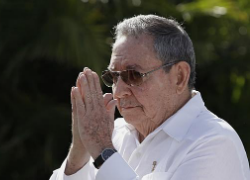Sunday evening, Cuban president Raul Castro announced that he would step down as the country’s president and communist leader after one final five-year term. In his address Sunday, President Castro explained that his resignation marked the beginning of the gradual and orderly transfer of key Cuban leadership roles to a new generation. The frail 86-year-old Fidel Castro, in a rare public appearance, was present at Sunday’s parliament session.

(Financial Review)
Equally surprising, President Castro has named a top vice president and successor. Miguel Diaz Canel, 52, is an electrical engineer and served in the Cuban military. Engaging in politics early on, he rose quickly through the local provincial Communist party’s hierarchy and eventually became Minister of Higher Education last year. Canel is seen as a loyalist and has been described as “a technocrat — a regional czar whose power is discrete but tangible.” Canel is the first Cuban to hold such a powerful, high-ranking position who did not fight alongside the Castro brothers in the Cuban Revolution.
When he addressed the Cuban Parliament Sunday, President Castro made it very clear that the Cuban government is working carefully and tactfully in building the country’s new generation of socialism. Canel is being identified as a vital player in the future of the island’s politics. The country is working to gingerly transition its political environment from the single-leader model to a more Chinese format where the political power lies with the Communist party instead.
The surprises continued Sunday when President Castro announced that large-scale constitutional changes were afoot since, during the remainder of his time as president, he would be working to establish term limits and age caps for political offices, even the presidency.
Although Canel’s ascendance to the Cuban presidency seemed solid Sunday, there is no guarantee that he will indeed become the country’s next president. In the past, other young, promising leaders have been pushed out of the country’s political power hierarchy for things like scandal or disloyalty. Plus, the party has numerous other high-ranking leaders in their 50s who have recently been given more significant roles.
Political analysts take this monumental step with a grain of salt, saying that this does not necessarily mean that the United States and Cuba will quickly rekindle their icy relationship. Law bars the United States from normalizing relations with Cuba as long as the Castro brothers rule the country. U.S.-Cuba relations have seen very minor improvements in the last few years, but with President Castro’s final term ending in 2018, the future of the strained relationship is still murky, at best.
Fidel and Raul Castro have governed Cuba since 1959. Fidel Castro spent forty-nine years as the island country’s president, formally stepping down and relinquishing power to his younger brother, Raul, in 2008.
Gaby Corica is a 3L at DU law, Staff Editor for the Denver Journal of International Law and Policy, and General Editor for The View From Above.


